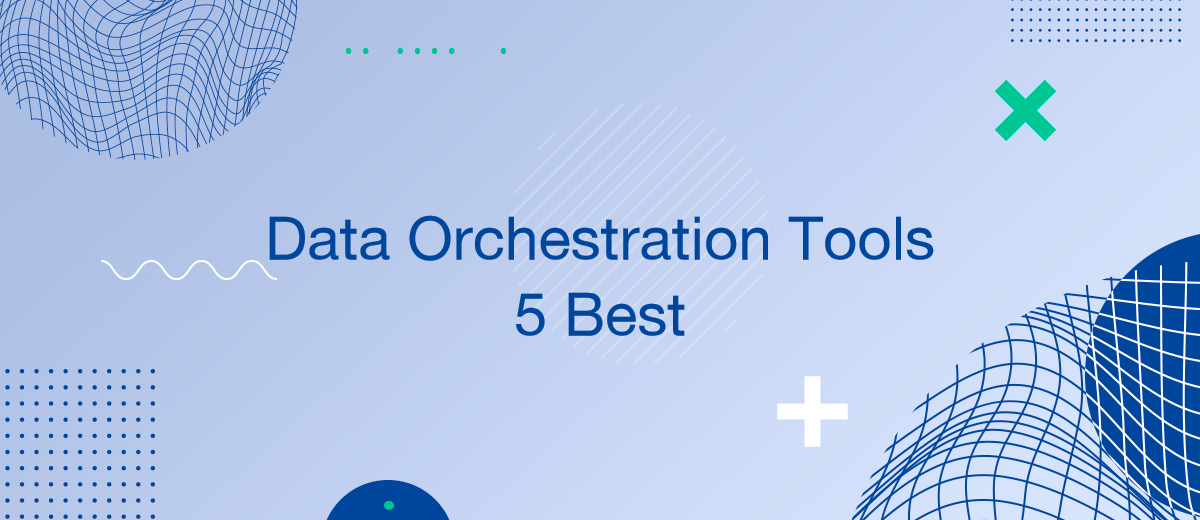We have already explained what data orchestration is. And in this article, we will look in more detail at data orchestration tools. Such services significantly reduce the need to manually intervene in processes by automating the transfer of data through various stages within their chains. They are regulators of information flows, aggregating data from many sources, structuring them for convenience, preparing them for analysis, and further use.
A truly high-quality tool for data orchestration has a cloud-based architecture and an intuitive user interface. For a long time, Apache Airflow has been the leading service in the data orchestration industry. It is an open-source platform in Python. Its user-friendly interface, wide scalability, active community support, and adoption by top technology corporations have made it a “must-have” for many teams working with data. However, does this mean that it is the best for everyone without exception? We offer you an overview of the five best data orchestration tools that will help improve the efficiency of your business. In this collection, we included Apache Airflow and four noteworthy alternatives.
Apache Airflow
Launch date – October 2014
Developer – Apache Software Foundation, Airbnb (started by Maxime Beauchemin)
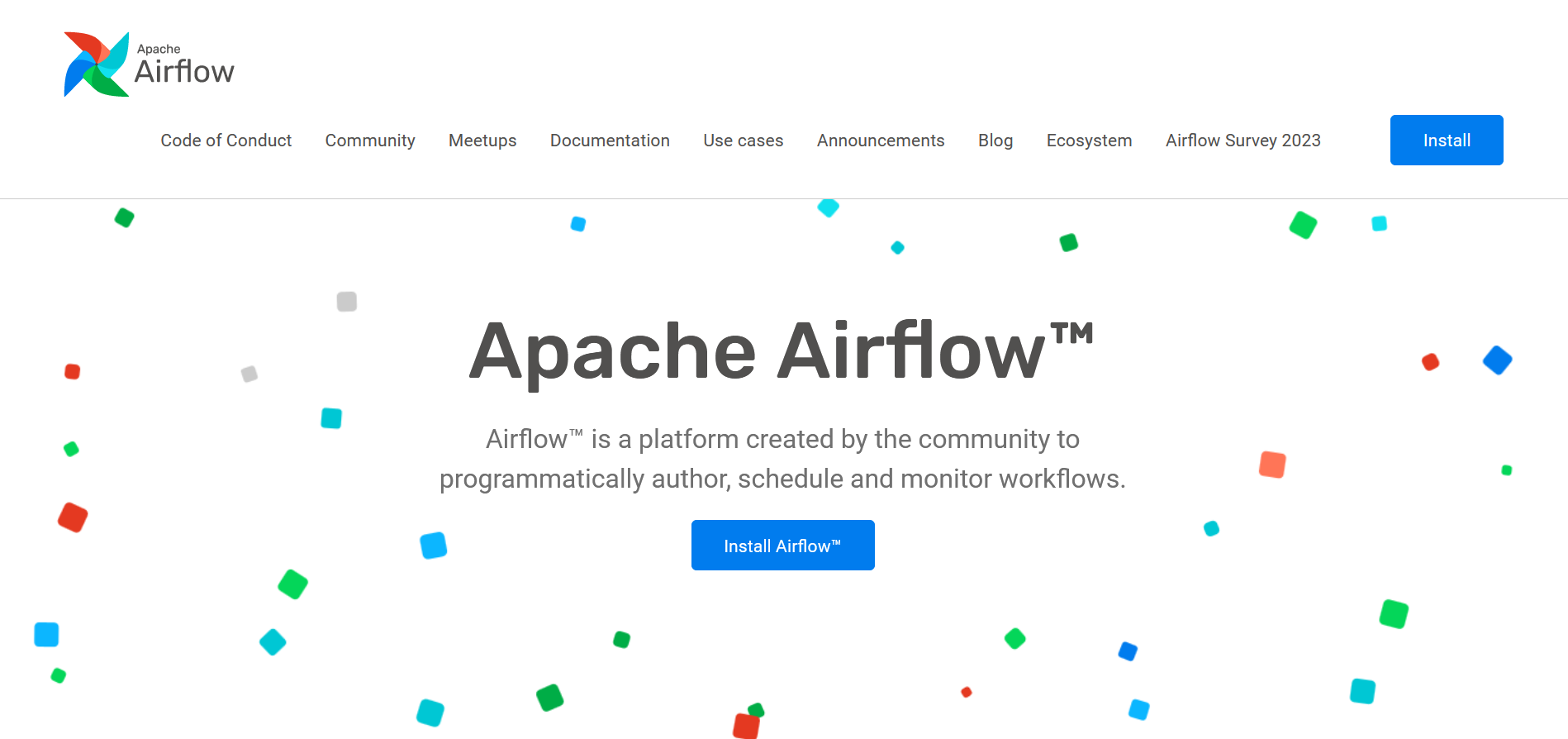
Apache Airflow is the first on our data orchestration tools list. It is a powerful open-source service that allows you to automate, plan, and monitor complex workflows. Airflow provides a flexible platform for developing, organizing, and managing these workflows through directed acyclic graphs (DAG) programming. This gives users the ability to define tasks and their dependencies in Python. To enhance understanding and ease of management, the service offers a graphical representation of workflows. Additionally, it integrates with various platforms designed for working with data, such as AWS, Google Cloud Platform, Microsoft Azure, and others.
Apache Airflow is particularly beneficial for companies dealing with large volumes of data that require complex processing and analytics. This service improves operational efficiency through automation, reduces the risk of errors, and enhances collaboration between developers and analysts. Furthermore, it increases the reliability and transparency of data processing.
Advantages:
- Extensibility. Users can create their own operators, sensors, and hooks.
- Dynamic planning. Jobs can be scheduled based on time, date, and even the completion of other tasks.
- Scalability. Airflow can scale to handle thousands of tasks.
- Convenient user interface. Easy access to execution logs, task planning and monitoring.
Unlike other orchestration tools such as Luigi or Apache Nifi, Airflow offers greater integration with various services. Additionally, it has a more flexible approach to programming workflows. Dynamic scheduling and powerful monitoring functionality also differentiate it from its competitors.
Apache Airflow is available for free use. However, when implemented in large-scale projects or used for commercial purposes, there may be costs associated with servers, data storage, development, and support.
Dagster
Launch date – August 2022
Developer – Dagster Labs (founder – Nick Schrock)
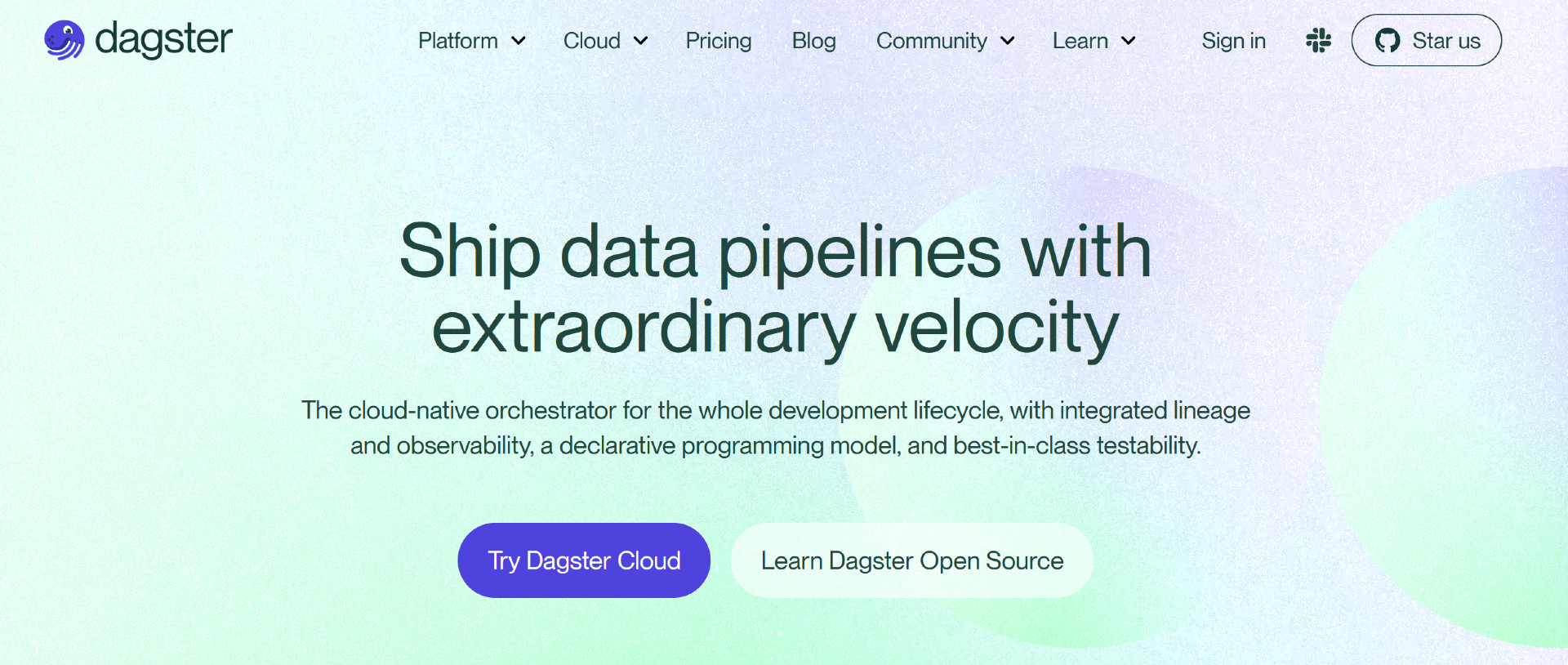
Dagster is a modern open-source data orchestration platform designed with an emphasis on performance, flexibility, and ease of use. It is designed to automate, monitor, and manage data science workflows and machine learning pipelines. With Dagster, developers can define complex workflows with clearly defined dependencies and execution parameters. The platform integrates with a variety of data warehouses, computing services, and analytics tools to create scalable and efficient solutions.
Dagster will be very useful for companies whose activities involve large volumes of data and who need a reliable, scalable system for processing them. The service offers a comprehensive solution for automating work processes of any complexity with the possibility of detailed control and analytics. This makes it an ideal choice for startups and mid-to-large businesses in finance, healthcare, marketing, e-commerce, and more.
Advantages:
- Typed data systems. Strong typing improves data quality and reliability.
- Modularity and code reuse. The service allows you to create reusable pipeline components, reducing development labor costs.
- Convenient web interface. Detailed visualization and monitoring of work processes in real time.
- Advanced integration. The platform easily integrates with popular tools and services. This greatly simplifies development and implementation.
Dagster stands out from competitors such as Apache Airflow and Luigi with its emphasis on data typing and ease of development. It offers a more declarative approach to defining workflows, making them easier to understand. In addition, the service provides better support for testing and development in a local environment.
Dagster is free to use. However, you will have to pay for commercial use, as well as additional services and support. The service offers the following tariff plans:
- Solo – $10 per month (7500 credits, 1 user).
- Starter – $100 per month (30,000 credits, 3 users).
- Pro – cost and contents are discussed individually.
The first two plans have a 30-day free trial. Regarding the availability and duration of the trial period for the Pro plan, you need to check with the service’s sales department.
Luigi
Launch date – 2012
Developer – Spotify (built mainly by Erik Bernhardsson and Elias Freider)
Luigi is an open-source data orchestration software that automates data processing and machine learning pipelines. This tool allows you to structure and run data processing tasks in a specific sequence, each of which may depend on the completion of the others. This ensures that complex work processes are carried out in an orderly and efficient manner.
What Luigi can do:
- Automate data pipelines: from simple sequences to complex processes with multiple dependencies.
- Visualize of dependencies and task progress through the web interface.
- Manage errors and re-execute tasks when necessary.
- Integrate with a variety of computing services, including Hadoop and AWS.
Luigi is ideal for companies looking to automate and streamline their data science and machine learning workflows. This service is especially relevant for organizations that need to process large volumes of information with a high degree of dependency between tasks. Luigi helps reduce pipeline development and execution time, improves data processing reliability, and provides greater process transparency.
- Automate the work with leads from the Facebook advertising account
- Empower with integrations and instant transfer of leads
- Don't spend money on developers or integrators
- Save time by automating routine tasks
Advantages:
- Dependency management. Explicitly defining dependencies between tasks makes it easier to create complex pipelines.
- Recovery after failures. The ability to restart tasks from the point of failure without having to re-execute the entire pipeline.
- Modularity. Developers can create and reuse tasks. This simplifies code management and reduces development time.
- Built-in web interface. Visualization of pipelines and their current state makes monitoring and debugging easier.
Unlike Apache Airflow, Luigi offers a simpler approach to managing task dependencies. This is preferable for small-scale projects or teams that are just getting started with data orchestration. However, Luigi offers less scalability and integration capabilities compared to Airflow.
Luigi is available for free to use. However, implementation in a commercial environment may require investment in servers, configuration, development, and support. The cost of using Luigi directly depends on the infrastructure where it is deployed and the resources that will be required to complete the tasks.
Prefect
Launch date – 2018
Developer – Jeremiah Lowin
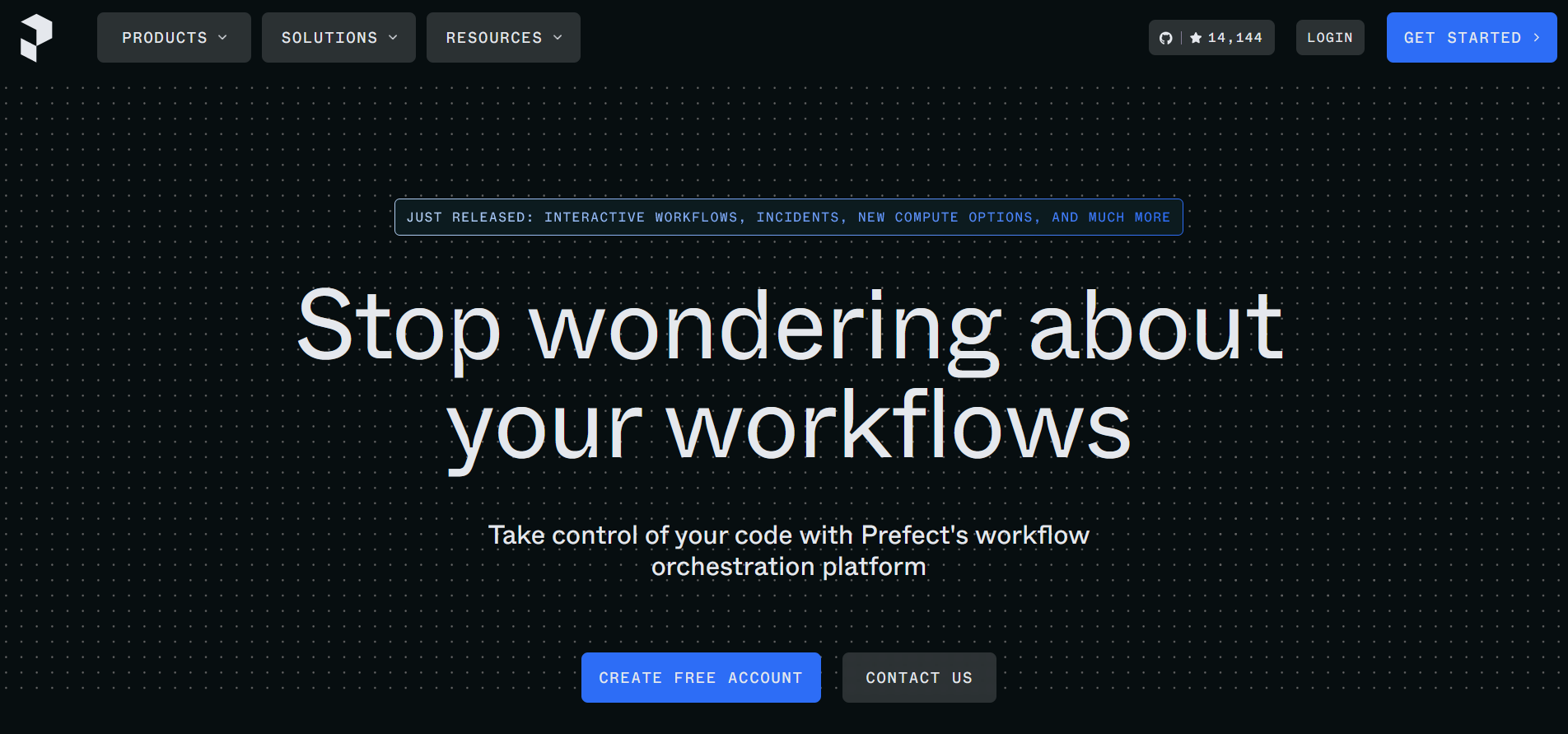
Prefect is a modern, powerful data orchestration tool designed for automating, monitoring, and managing work processes. The system is designed with a focus on simplifying data management and providing high levels of reliability and scalability. Prefect offers an intuitive interface and a solid set of tools that help companies streamline their workflows while minimizing the likelihood of errors.
Prefect is ideal for companies of any size looking to automate and streamline their data processes. It will be especially useful for organizations operating in areas where high-reliability processing is required, such as finance, healthcare, science, and research. This platform helps partially eliminate manual labor, reduce the risk of errors to zero, and speed up the product launch to the market.
Advantages:
- Automate complex workflows using a declarative approach to defining tasks and dependencies.
- Monitor and control pipelines in real time through a graphical user interface.
- Built-in error handling and task retries, increasing system resilience to failures.
- Support for flexible configuration and expanded functionality through integration with other services and tools.
Prefect differs from platforms like Apache Airflow or Luigi in its emphasis on usability and automatic error handling. This makes it more accessible for novice users and more reliable in operation. In addition, the service has more advanced monitoring and visualization capabilities, making it easier to manage complex workflows.
Prefect offers 3 tariff plans:
- Free – a free option with limited functionality. Suitable for small teams or to get acquainted with the platform.
- Pro – $405 per month, subject to payment for the year at once.
- Enterprise – cost is discussed individually.
Pro and Enterprise plans provide advanced features, support, and scalability. They are best suited for large enterprises and projects.
Shipyard
Launch date – 2020
Developer – Shipyard, LLC (founders – Blake Burch, Mark Lurie)
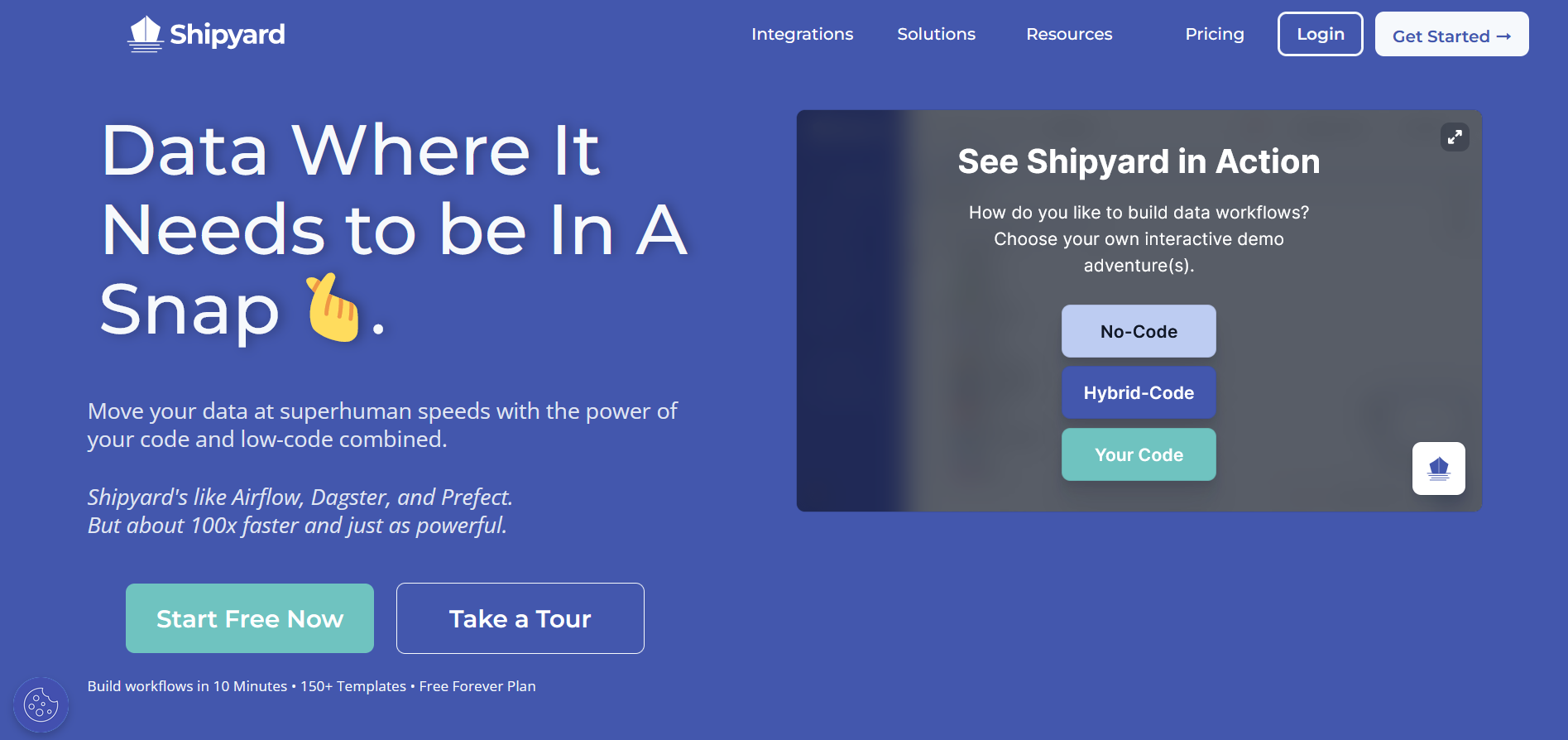
Shipyard is a modern platform for data workflow orchestration. It allows you to easily connect tools, automate workflows, and create a reliable infrastructure. It provides low-level programming using a visual interface. This eliminates the need to write code to create data workflows. As a result, engineers are able to get their designs into production faster. If existing templates do not solve the problem, engineers can automate scripts in the chosen programming language. Thus, any internal or external processes can be integrated into work processes.
Shipyard is ideal for those seeking simplified data development and implementation without extensive technical knowledge. It will be especially useful for startups and medium-sized businesses that need flexibility and scalability but do not have the funds to make significant investments in infrastructure or personnel.
Advantages:
- Wide selection of templates. Using templates speeds up the process of creating new workflows and makes teams more efficient.
- Providing surveillance and warning. These built-in features help you quickly identify and resolve problems before they become critical.
- High level of parallelism and encryption. This allows data teams to get more done without relying on other teams or worrying about infrastructure issues. In addition, trust is ensured in the data they provide.
Shipyard differs from Apache Airflow, Luigi, and Prefect in several key ways. Unlike Airflow and Luigi, which require coding to create workflows, Shipyard offers a visual interface that is accessible to users without deep technical knowledge. This service allows you to quickly get started with a lower entry threshold compared to more complex and demanding systems like Apache Airflow. The Shipyard platform offers a high level of support and training resources. This will be especially valuable for companies that do not have much experience with data orchestration. However, large organizations with complex needs and the need for deep customization may need a more flexible and powerful tool. They are better suited to Apache Airflow or Prefect, whose programming and configuration capabilities are much wider.
Shipyard offers 4 tariff plans:
- Developer – there is no fee for using the platform, but each minute of runtime costs $0.10. Functionality is limited.
- Team – $300 per month for using the platform plus runtime.
- Business – $1250 per month for using the platform (subject to payment for the year at once) plus runtime.
- Enterprise – cost is discussed individually.
The platform fee is fixed and covers the cost of using Shipyard. The runtime fee depends on the time it takes to complete your tasks on it.
How to Choose a Data Orchestration Platform
When choosing the best data orchestration platforms for your organization, consider these key aspects:
- Scale of integration. Prioritize solutions that can interact with all current and potential data sources and sinks. It is important that the chosen system provides extensive integration capabilities and is ready for future changes in the data infrastructure.
- User comfort. Choose a platform with an intuitive interface. This will speed up the implementation process and reduce time to market. Look for solutions that support low code and no code development. Pay attention to those that offer flexibility in choosing cloud services or the ability to work without being tied to a specific cloud. This will allow you to bypass the limitations of specific technological ecosystems.
- Transparency of pricing policy. It is important to fully understand the total cost of using the service you choose. Preference should be given to a platform with affordable and transparent prices. This way, you can easily assess their impact on the project budget.
- Customer reviews. Research the opinions and reviews of users of each platform you are considering. Positive experiences from other data scientists may indicate that the product will meet your requirements as well.
- Special offer. Pay attention to the unique features and additional benefits offered by the service. This could be anything from built-in analytics tools to out-of-the-box monitoring capabilities. Some of them may be very important for your project.
If you are primarily focused on automating the transfer of data between different systems and applications, then pay attention to our SaveMyLeads service. With the help of this simple tool, you will be able to connect ready-made integrations in no-code mode independently. Register on our site, automate work processes, and increase your productivity.
Bottom Line
Apache Airflow continues to be a leader among data orchestration tools today. However, the alternatives we suggest in this article may provide a set of unique features and benefits that are ideal for your team. Whether it's the pursuit of simplicity, a code-centric approach, or advanced integration of machine learning processes, there's likely to be something that suits your needs perfectly. By exploring the top five platforms, you can choose the right tool to help you optimize your data processing and enhance the efficiency of your data projects.
Are you using Facebook Lead Ads? Then you will surely appreciate our service. The SaveMyLeads online connector is a simple and affordable tool that anyone can use to set up integrations for Facebook. Please note that you do not need to code or learn special technologies. Just register on our website and create the necessary integration through the web interface. Connect your advertising account with various services and applications. Integrations are configured in just 5-10 minutes, and in the long run they will save you an impressive amount of time.
